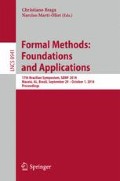Abstract
Adding to the modal description of transition structures the ability to refer to specific states, hybrid(ised) logics provide an interesting framework for the specification of reconfigurable systems. The qualifier ‘hybrid(ised)’ refers to a generic method of developing, on top of whatever specification logic is used to model software configurations, the elements of an hybrid language, including nominals and modalities. In such a context, this paper shows how a calculus for a hybrid(ised) logic can be generated from a calculus of the base logic and that, moreover, it preserves soundness and completeness. A second contribution establishes that hybridising a decidable logic also gives rise to a decidable hybrid(ised) one. These results pave the way to the development of dedicated proof tools for such logics used in the design of reconfigurable systems.
Access this chapter
Tax calculation will be finalised at checkout
Purchases are for personal use only
Preview
Unable to display preview. Download preview PDF.
References
Areces, C., ten Cate, B.: Hybrid logics. In: Blackburn, P., Wolter, F., van Benthem, J. (eds.) Handbook of Modal Logics. Elsevier (2006)
Baltazar, P.: Probabilization of logics: Completeness and decidability. Logica Universalis 7(4), 403–440 (2013)
Braüner, T.: Proof-Theory of Propositional Hybrid Logic. Hybrid Logic and its Proof-Theory (2011)
Caleiro, C., Sernadas, C., Sernadas, A.: Parameterisation of logics. In: Fiadeiro, J.L. (ed.) WADT 1998. LNCS, vol. 1589, pp. 48–63. Springer, Heidelberg (1999)
Diaconescu, R.: Institution-independent Model Theory. Birkhäuser, Basel (2008)
Diaconescu, R.: Institutional semantics for many-valued logics. Fuzzy Sets Syst. 218, 32–52 (2013)
Diaconescu, R., Stefaneas, P.: Ultraproducts and possible worlds semantics in institutions. Theor. Comput. Sci. 379(1–2), 210–230 (2007)
Fiadeiro, J., Sernadas, A.: Structuring theories on consequence. In: Sannella, D., Tarlecki, A. (eds.) Abstract Data Types 1987. LNCS, vol. 332, pp. 44–72. Springer, Heidelberg (1988)
Finger, M., Gabbay, D.: Adding a temporal dimension to a logic system. Journal of Logic, Language and Information 1(3), 203–233 (1992)
Goguen, J.A., Burstall, R.M.: Institutions: abstract model theory for specification and programming. J. ACM 39, 95–146 (1992)
Goguen, J.A., Meseguer, J.: Models and equality for logical programming. In: Ehrig, H., Kowalski, R., Levi, G., Montanari, U. (eds.) TAPSOFT 1987 and CFLP 1987. LNCS, vol. 250, pp. 1–22. Springer, Heidelberg (1987)
Hoffmann, G., Areces, C.: Htab: a terminating tableaux system for hybrid logic. Electr. Notes Theor. Comput. Sci. 231, 3–19 (2009)
Madeira, A., Faria, J.M., Martins, M.A., Barbosa, L.S.: Hybrid specification of reactive systems: an institutional approach. In: Barthe, G., Pardo, A., Schneider, G. (eds.) SEFM 2011. LNCS, vol. 7041, pp. 269–285. Springer, Heidelberg (2011)
Martins, M.A., Madeira, A., Diaconescu, R., Barbosa, L.S.: Hybridization of institutions. In: Corradini, A., Klin, B., Cîrstea, C. (eds.) CALCO 2011. LNCS, vol. 6859, pp. 283–297. Springer, Heidelberg (2011)
Neves, R., Madeira, A., Martins, M.A., Barbosa, L.S.: Hybridisation at work. In: Heckel, R., Milius, S. (eds.) CALCO 2013. LNCS, vol. 8089, pp. 340–345. Springer, Heidelberg (2013)
Rasga, J., Sernadas, A., Sernadas, C.: Importing logics: Soundness and completeness preservation. Studia Logica 101(1), 117–155 (2013)
Author information
Authors and Affiliations
Corresponding author
Editor information
Editors and Affiliations
Rights and permissions
Copyright information
© 2015 Springer International Publishing Switzerland
About this paper
Cite this paper
Neves, R., Martins, M.A., Barbosa, L.S. (2015). Completeness and Decidability Results for Hybrid(ised) Logics. In: Braga, C., Martí-Oliet, N. (eds) Formal Methods: Foundations and Applications. SBMF 2014. Lecture Notes in Computer Science(), vol 8941. Springer, Cham. https://doi.org/10.1007/978-3-319-15075-8_10
Download citation
DOI: https://doi.org/10.1007/978-3-319-15075-8_10
Published:
Publisher Name: Springer, Cham
Print ISBN: 978-3-319-15074-1
Online ISBN: 978-3-319-15075-8
eBook Packages: Computer ScienceComputer Science (R0)

